- Home
- Barry Eisler
Rain Fall
Rain Fall Read online
RAIN FALL
The first book in the John Rain series
BARRY EISLER
Copyright © 2002
CONTENT
Synopsis
PART ONE
1
2
3
4
5
6
7
8
9
10
11
12
13
PART TWO
14
15
16
17
18
PART THREE
19
20
21
22
23
24
25
26
ACKNOWLEDGMENTS
AUTHOR’S NOTE
Synopsis
Meet John Rain. Assassin. He follows his own code — he needs no one, trusts no one — until betrayal transforms him from hunter into hunted and loner into loyal friend. Haunted by the past, Rain kills to order and leaves no trace but the death at his hand of an old man has unforseen complications — and soon Rain is trying to protect not just his carefully preserved anonymity but his own life and those of the people he cares for. A stunning, page-turning reinvention of the hitman thriller, Rain Fall marks the introduction of a compelling new series and major new thriller writing career.
DEDICATION
THIS NOVEL is for three people who are not here to read it.
For my father, Edgar, who gave me strength.
For my mother, Barbara, who gave me insight.
For my brother, Ian, who helped me climb the mountain, whose memory keeps me climbing still.
In the changing of the times, they were like autumn lightning, a thing out of season, an empty promise of rain that would fall unheeded on fields already bare.
— SHOSABURO ABE,
On the Meiji-era samurai
PART ONE
Who is the third who walks always beside you?
When I count, there are only you and I together
But when I look ahead up the white road
There is always another one walking beside you
Gliding wrapt in a brown mantle, hooded
I do not know whether a man or a woman
— But who is that on the other side of you?
— T. S. ELIOT, The Waste Land
1
HARRY CUT THROUGH the morning rush-hour crowd like a shark fin through water. I was following from twenty meters back on the opposite side of the street, sweating with everyone else in the unseasonable October Tokyo heat, and I couldn’t help admiring how well the kid had learned what I’d taught him. He was like liquid the way he slipped through a space just before it closed, or drifted to the left to avoid an emerging bottleneck. The changes in Harry’s cadence were accomplished so smoothly that no one would recognize he had altered his pace to narrow the gap on our target, who was now moving almost conspicuously quickly down Dogenzaka toward Shibuya Station.
The target’s name was Yasuhiro Kawamura. He was a career bureaucrat connected with the Liberal Democratic Party, or LDP, the political coalition that has been running Japan almost without a break since the war. His current position was vice minister of land and infrastructure at the Kokudokotsusho, the successor to the old Construction Ministry and Transport Ministry, where he had obviously done something to seriously offend someone because serious offense is the only reason I ever get a call from a client.
I heard Harry’s voice in my ear: “He’s going into the Higashimura fruit store. I’ll set up ahead.” We were each sporting a Danish-made, microprocessor-controlled receiver small enough to nestle in the ear canal, where you’d need a flashlight to find it. A voice transmitter about the same size goes under the jacket lapel. The transmissions are burst UHF, which makes them very hard to pick up if you don’t know exactly what you’re looking for, and they’re scrambled in case you do. The equipment freed us from having to maintain constant visual contact, and allowed us to keep moving for a while if the target stopped or changed direction. So even though I was too far back to see it, I knew where Kawamura had exited, and I could continue walking for some time before having to stop to keep my position behind him. Solo surveillance is difficult, and I was glad I had Harry with me.
About twenty meters from the Higashimura, I turned off into a drugstore, one of the dozens of open-façade structures that line Dogenzaka, catering to the Japanese obsession with health nostrums and germ fighting. Shibuya is home to many different buzoku, or tribes, and members of several were represented here this morning, united by a common need for one of the popular bottled energy tonics in which the drugstores specialize, tonics claiming to be bolstered with ginseng and other exotic ingredients but delivering instead with a more prosaic jolt of ordinary caffeine. Waiting in front of the register were several gray-suited sarariman — “salary man,” corporate rank and file — their faces set, cheap briefcases dangling from tired hands, fortifying themselves for another interchangeable day in the maw of the corporate machine. Behind them, two empty-faced teenage girls, their hair reduced to steel-wool brittleness by the dyes they used to turn it orange, noses pierced with oversized rings, their costumes meant to proclaim rejection of the traditional route chosen by the sarariman in front of them but offering no understanding of what they had chosen instead. And a gray-haired retiree, his skin sagging but his face oddly bright, probably in Shibuya to avail himself of one of the area’s well-known sexual services, which he would pay for out of a pension account that he kept hidden from his wife, not realizing that she knew what he was up to and simply didn’t care.
I wanted to give Kawamura about three minutes to get his fruit before I came out, so I examined a selection of bandages that gave me a view of the street. The way he had ducked into the store looked like a move calculated to flush surveillance, and I didn’t like it. If we hadn’t been hooked up the way we were, Harry would have had to stop abruptly to maintain his position behind the target. He might have had to do something ridiculous, like tie his shoe or stop to read a street sign, and Kawamura, probably peering out of the entranceway of the store, could have made him. Instead, I knew Harry would continue past the fruit store; he would stop about twenty meters ahead, give me his location, and fall in behind when I told him the parade was moving again.
The fruit store was a good spot to turn off, all right — too good for someone who knew the route to have chosen it by accident. But Harry and I weren’t going to be flushed out by amateur moves out of some government antiterrorist primer. I’ve had that training, so I know how useful it is.
I left the drugstore and continued down Dogenzaka, more slowly than before because I had to give Kawamura time to come out of the store. Shorthand thoughts shot through my mind: Are there enough people between us to obscure his vision if he turns when he comes out? What shops am I passing if I need to duck off suddenly? Is anyone looking up the street at the people heading toward the station, maybe helping Kawamura spot surveillance? If I had already drawn any counter surveillance attention, they might notice me now, because before I was hurrying to keep up with the target and now I was taking my time, and people on their way to work don’t change their pace that way. But Harry had been the one walking point, the more conspicuous position, and I hadn’t done anything to arouse attention before stopping in the drugstore.
I heard Harry again: “I’m at one-oh-nine.” Meaning he had turned into the landmark 109 Department Store, famous for its collection of 109 restaurants and trendy boutiques.
“No good,” I told him. “The first floor is lingerie. You going to blend in with fifty teenage girls in blue sailor school uniforms picking out padded bras?”
“I was planning t
o wait outside,” he replied, and I could imagine him blushing.
The front of 109 is a popular meeting place, typically crowded with a polyglot collection of pedestrians. “Sorry, I thought you were going for the lingerie,” I said, suppressing the urge to smile. “Just hang back and wait for my signal as we go past.”
“Right.”
The fruit store was only ten meters ahead, and still no sign of Kawamura. I was going to have to slow down. I was on the opposite side of the street, outside Kawamura’s probable range of concern, so I could take a chance on just stopping, maybe to fiddle with a cell phone. Still, if he looked, he would spot me standing there, even though, with my father’s Japanese features, I don’t have a problem blending into the crowds. Harry, a pet name for Haruyoshi, being born of two Japanese parents, has never had to worry about sticking out.
When I returned to Tokyo in the early eighties, my brown hair, a legacy from my mother, worked for me the way a fluorescent vest does for a hunter, and I had to dye it black to develop the anonymity that protects me now. But in the last few years the country has gone mad for chappatsu, or tea-color dyed hair, and I don’t have to be so vigilant about the dye anymore. I like to tell Harry he’s going to have to go chappatsu if he wants to fit in, but Harry’s too much of an otaku, a geek, to give much thought to issues like personal appearance. I guess he doesn’t have that much to work with, anyway: an awkward smile that always looks like it’s offered in anticipation of a blow, a tendency to blink rapidly when he’s excited, a face that’s never lost its baby fat, its pudginess accentuated by a shock of thick black hair that on bad days seems almost to float above it. But the same qualities that keep him off magazine covers confer the unobtrusiveness that makes for effective surveillance.
I had reached the point where I was sure I was going to have to stop when Kawamura popped out of the fruit store and reentered the flow. I hung back as much as possible to increase the space between us, watching his head bobbing as he moved down the street. He was tall for a Japanese and that helped, but he was wearing a dark suit like ninety percent of the other people in this crowd — including Harry and me, naturally, so I couldn’t drop back too far.
Just as I’d redeveloped the right distance, he stopped and turned to light a cigarette. I continued moving slowly behind and to the right of the group of people that separated us, knowing he wouldn’t be able to make me moving with the crowd. I kept my attention focused on the backs of the suits in front of me, just a bored morning commuter. After a moment he turned and started moving again.
I allowed myself the trace of a satisfied smile. Japanese don’t stop to light cigarettes; if they did, they’d lose weeks over the course of their adult lives. Nor was there any reason, such as a strong headwind threatening to blow out a match, for him to turn and face the crowd behind him. Kawamura’s obvious attempt at counter surveillance simply confirmed his guilt.
Guilt of what I don’t know, and in fact I never ask. I insist on only a few questions. Is the target a man? I don’t work against women or children. Have you retained anyone else to solve this problem? I don’t want my operation getting tripped up by someone’s idea of a B-team, and if you retain me, it’s an exclusive. Is the target a principal? I solve problems directly, like the soldier I once was, not by sending messages through uninvolved third parties like a terrorist. The concerns behind the last question are why I like to see independent evidence of guilt: It confirms that the target is indeed the principal and not a clueless innocent.
Twice in eighteen years the absence of that evidence has stayed my hand. Once I was sent against the brother of a newspaper editor who was publishing stories on corruption in a certain politician’s home district. The other time it was against the father of a bank reformer who showed excessive zeal in investigating the size and nature of his institution’s bad debts. I would have been willing to act directly against the editor and the reformer, had I been retained to do so, but apparently the clients in question had reason to pursue a more circuitous route that involved misleading me. They are no longer clients, of course. Not at all.
I’m not a mercenary, although I was nothing more than that once upon a time. And although I do in a sense live a life of service, I am no longer samurai, either. The essence of samurai is not just service, but loyalty to his master, to a cause greater than himself. There was a time when I burned with loyalty, a time when, suffused with the samurai ethic I had absorbed from escapist novels and comics as a boy in Japan, I was prepared to die in the service of my adopted liege lord, the United States. But loves as uncritical and unrequited as that one can never last, and usually come to a dramatic end, as mine did. I am a realist now.
As I came to the 109 building I said, “Passing.” Not into my lapel or anything stupid like that; the transmitters are sensitive enough so that you don’t need to make any subtle movements that are like billboards for a trained counter surveillance team. Not that one was out there, but you always assume the worst. Harry would know I was passing his position and would fall in after a moment.
Actually, the popularity of cell phones with earpieces makes this kind of work easier than it once was. It used to be that someone walking alone and talking under his breath was either demented or an intelligence or security agent. Today you see this sort of behavior all the time among Japan’s keitai, or cell phone, generation.
The light at the bottom of Dogenzaka was red, and the crowd congealed as we approached the five-street intersection in front of the train station. Garish neon signs and massive video monitors flashed frantically on the buildings around us. A diesel-powered truck ground its gears as it slogged through the intersection, laborious as a barge in a muddy river, its bullhorns blaring distorted right-wing patriotic songs that momentarily drowned out the bells commuters on bicycles were ringing to warn pedestrians out of the way. A street hawker angled a pushcart through the crowds, sweat running down the sides of his face, the smell of steamed fish and rice following in his zigzagging wake. An ageless homeless man, probably a former sarariman who had lost his job and his moorings when the bubble burst in the late eighties, slept propped against the base of a streetlight, inured by alcohol or despair to the tempest around him.
The Dogenzaka intersection is like this night and day, and at rush hour, when the light turns green, over three hundred people step off the curb at the same instant, with another twenty-five thousand waiting in the crush. From here on, it was going to be shoulder to shoulder, chest to back. I would keep close to Kawamura now, no more than five meters, which would put about two hundred people between us. I knew he had a commuter pass and wouldn’t need to go to the ticket machine. Harry and I had purchased our tickets in advance so we would be able to follow him right through the wickets. Not that the attendant would notice one way or the other. At rush hour, they’re practically numbed by the hordes; you could flash anything, a baseball card, probably, and in you’d go.
The light changed, and the crowds swept into one another like a battle scene from some medieval epic. An invisible radar I’m convinced is possessed only by Tokyoites prevented a mass of collisions in the middle of the street. I watched Kawamura as he cut diagonally across to the station, and maneuvered in behind him as he passed. There were five people between us as we surged past the attendant’s booth. I had to stay close now. It would be chaos when the train pulled in: five thousand people pouring out, five thousand people stacked fifteen deep waiting to get on, everyone jockeying for position. Foreigners who think of Japan as a polite society have never ridden the Yamanote at rush hour.
The river of people flowed up the stairs and onto the platform, and the sounds and smells of the station seemed to arouse an extra sense of urgency in the crowd. We were swimming upstream against the people who had just gotten off the train, and as we reached the platform the doors were already closing on handbags and the odd protruding elbow. By the time we had passed the kiosk midway down the platform, the last car had passed us and a moment later it was gone. The n
ext train would arrive in two minutes.
Kawamura shuffled down the middle of the platform. I stayed behind him but hung back from the tracks, avoiding his wake. He was looking up and down the platform, but even if he had spotted Harry or me earlier, seeing us waiting for the train wasn’t going to unnerve him. Half the people waiting had just walked down Dogenzaka.
I felt the rumble of the next train as Harry walked past me like a fighter jet buzzing a carrier control tower, the slightest nod of his head indicating that the rest was with me. I had told him I only needed his help until Kawamura was on the train, which is where he had always gone during our previous surveillance. Harry had done his usual good work in helping me get close to the target, and, per our script, he was now exiting the scene. I would contact him later, when I was done with the solo aspects of the job.
Harry thinks I’m a private investigator and that all I do is follow these people around collecting information. To avoid the suspicious appearance of a too-high mortality rate for the subjects we track, I often have him follow people in whom I have no interest, who of course then provide some measure of cover by continuing to live their happy and oblivious lives. Also, where possible, I avoid sharing the subject’s name with Harry to minimize the chances that he’ll come across too many coincidental obituaries. Still, some of our subjects do have a habit of dying at the end of surveillance, and I know Harry has a curious mind. So far he hasn’t asked, which is good. I like Harry as an asset and wouldn’t want him to become a liability.
I moved up close behind Kawamura, just another commuter trying to get a good position for boarding the train. This was the most delicate part of the operation. If I flubbed it, he would make me and it would be difficult to get sufficiently close to him for a second try.
My right hand dipped into my pants pocket and touched a microprocessor-controlled magnet, about the size and weight of a quarter. On one side the magnet was covered with blue worsted cloth, like that of the suit Kawamura was wearing. Had it been necessary, I could have stripped away the blue to expose a layer of gray, which was the other color Kawamura favored. On the opposite side of the magnet was an adhesive backing.

 All the Devils
All the Devils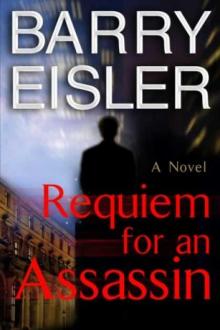 Requiem for an Assassin
Requiem for an Assassin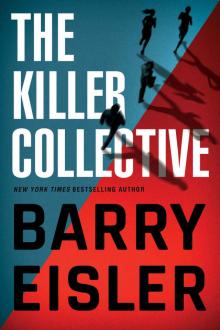 The Killer Collective
The Killer Collective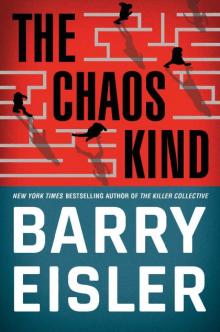 The Chaos Kind
The Chaos Kind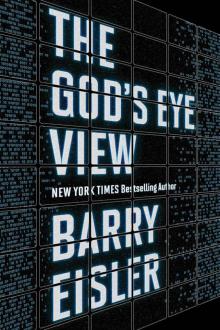 The God's Eye View
The God's Eye View Paris is a Bitch
Paris is a Bitch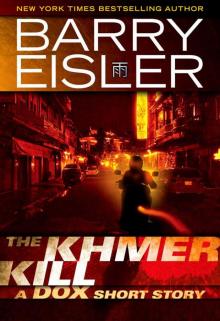 The Khmer Kill: A Dox Short Story (Kindle Single)
The Khmer Kill: A Dox Short Story (Kindle Single)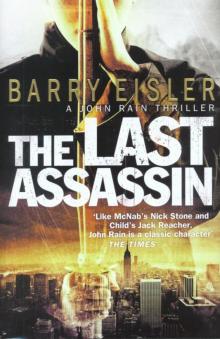 The Last Assassin
The Last Assassin The Detachment
The Detachment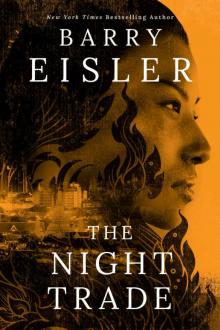 The Night Trade (A Livia Lone Novel Book 2)
The Night Trade (A Livia Lone Novel Book 2)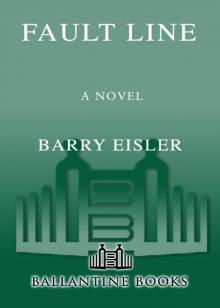 Fault Line
Fault Line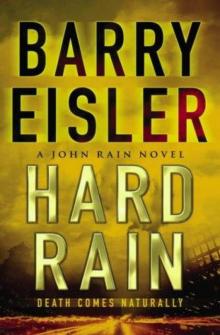 Hard Rain
Hard Rain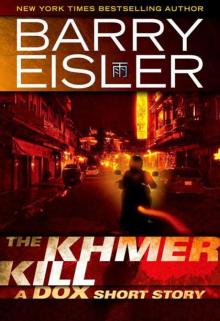 The Khmer Kill_A Dox Short Story
The Khmer Kill_A Dox Short Story London Twist: A Delilah Novella
London Twist: A Delilah Novella The Lost Coast
The Lost Coast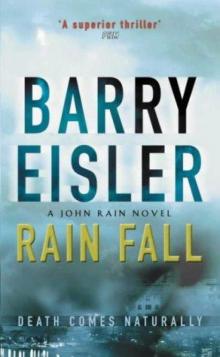 Rain Fall
Rain Fall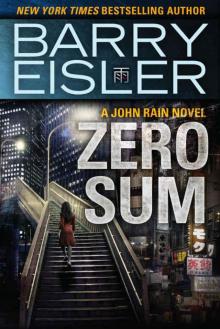 Zero Sum
Zero Sum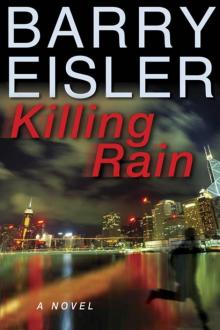 Killing Rain
Killing Rain John Rain 08: Graveyard of Memories
John Rain 08: Graveyard of Memories A Clean Kill in Tokyo (previously published as Rain Fall)
A Clean Kill in Tokyo (previously published as Rain Fall) Inside Out: A novel
Inside Out: A novel John Rain 07 - The Detachment
John Rain 07 - The Detachment Graveyard of Memories
Graveyard of Memories The Lost Coast -- A Larison Short Story
The Lost Coast -- A Larison Short Story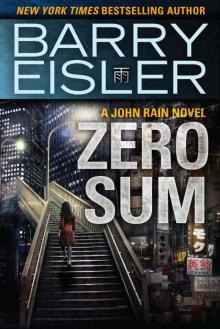 Zero Sum (A John Rain Novel)
Zero Sum (A John Rain Novel)